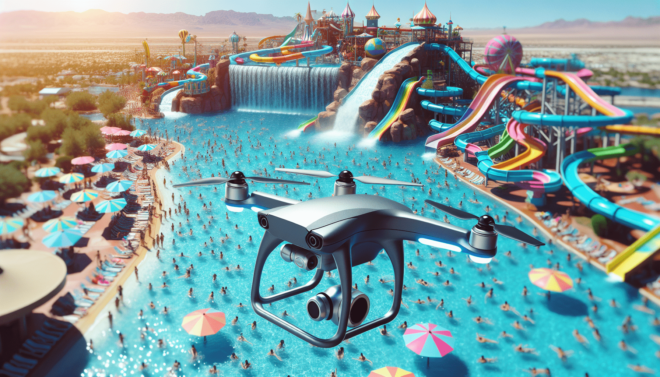Have you ever wondered why drones are not allowed to soar above the bright blue waters of Las Vegas’ water parks or pools? It’s an intriguing question that invites both curiosity and consideration about the intricate web of rules and regulations that govern the skies above this vibrant city. Drone technology has taken flight in various sectors, revolutionizing the way we capture aerial images, deliver goods, and even conduct emergency services. Yet, there are limits to where these flying devices can go, particularly over places filled with splashing water and sunbathing crowds. Let’s embark on a journey to untangle this prohibition and uncover the reasons behind it.
The Surging Popularity of Drones
The technological evolution of drones has truly lifted our experiences to new heights. Initially utilized primarily in military and professional photography applications, drones have become widely accessible for personal and recreational use. Equipped with high-quality cameras, user-friendly controls, and advanced navigation systems, drones have found admirers among hobbyists, photographers, and technology enthusiasts alike. In a city known for its glamour and glitz, like Las Vegas, the allure of capturing the vibrant landscapes and dynamic cityscape from above is unmistakable.
Different Types of Drones
Despite the overarching category of drones, there are various types suited for different purposes:
| Type of Drone | Key Features | Common Uses |
|---|---|---|
| Consumer Drones | Lightweight, easy to use, equipped with cameras | Recreational photography, personal entertainment |
| Professional Drones | Advanced cameras, longer flight times | Professional photography, videography |
| Racing Drones | High-speed, agile, built for competition | Drone racing, hobby flying |
| Industrial Drones | Durable, can carry heavier loads | Agricultural monitoring, construction services |
With the spectrum of uses, it’s evident that drones have embedded themselves into various aspects of modern life, demonstrating both recreational and practical utility.
Drone Regulations: A Broad Overview
Before soaring further into the skies of Las Vegas, it’s essential to understand the national and local regulations in place to ensure safe and responsible drone operation. In the United States, the Federal Aviation Administration (FAA) oversees the regulation of drones, establishing specific guidelines to mitigate safety and privacy concerns.
Key FAA Regulations
Here’s a snapshot of crucial FAA regulations applicable to most drone operators:
- Registration: Drones weighing over 0.55 pounds must be registered.
- Altitude Limits: Drones are generally restricted to a maximum altitude of 400 feet.
- Line of Sight: Operators must maintain visual line of sight with their drone.
- Airspace Restrictions: Certain airspace is off-limits or requires special authorization, particularly around airports and sensitive zones.
Understanding these guidelines is fundamental for any drone enthusiast looking to operate their drone safely and legally.
Las Vegas: A Unique Airspace
Las Vegas isn’t just renowned for its casinos and entertainment; it’s a city that presents unique airspace challenges and considerations. The city’s bustling air traffic around McCarran International Airport necessitates stringent airspace management, particularly with incoming and outgoing flights ever bustling. But what’s specifically impacting the restriction over water parks and pools?
Concerns Over Water Parks and Pools
Water parks and pools are places where individuals seek relaxation, recreation, and a respite from the often scorching Las Vegas sun. Incorporating drones into this mix presents several unique challenges:
-
Privacy Concerns: Water parks and pools are inherently public places where individuals expect a degree of privacy while they are in bathing suits and engaging in leisure activities. Drone-induced surveillance or inadvertent photography can invade personal privacy.
-
Safety Risks: An accidental drone crash over crowded pools could lead to injuries or disturbances, given the compact and lively nature of these spaces.
-
Operational Disruptions: Drones could potentially cause disturbances or distractions, interrupting the operations of the water park, including lifeguard monitoring and emergency responses.
Privacy: A Key Factor
One of the cardinal concerns leading to the prohibition of drones over pools and water parks is the issue of privacy. While drones offer incredible technology for capturing sweeping vistas and live events, their capability to record without consent raises significant ethical and legal questions.
Understanding Privacy Issues
Privacy concerns arise from the following aspects of drone operation:
- Surveillance Capabilities: Equipped with sophisticated cameras and occasionally microphones, drones can record both visual and audio data without the subject’s knowledge.
- Data Security Risks: Data collected by drones, intentionally or unintentionally, may be vulnerable to breaches or misuse.
- Personal Space Violations: Overflight over pools may expose individuals to unwanted attention or capture, violating their sense of personal space and sanctity.
As recreational drones become more advanced, these privacy concerns amplify, necessitating vigilant regulatory governance.
Safety Concerns Are Paramount
In venues like water parks or pools, where large numbers of people gather, the potential risks associated with drones become magnified. Ensuring visitor safety is a top priority, and the unregulated presence of drones could compromise this.
Drones and Their Risks
The inherent risks of drones include:
- Mechanical Failures: Technical malfunctions might cause drones to lose control, potentially leading to crashes that could harm patrons or cause property damage.
- Interference with Operations: Drones may collide with park equipment or disrupt regular activities, creating hazardous situations.
- Public Panic: The unexpected presence or erratic movements of drones can incite panic or fear among visitors, particularly if their operation is misconstrued as a potential threat.
Consequently, strict safety regulations are vital to managing these risks effectively, ensuring a secure and enjoyable environment for everyone.
Technological Limitations and Malfunctions
Despite the sophistication of modern drones, they are not immune to technological failures, which can have unintended consequences in public areas such as water parks.
Common Drone Failures
Several common issues could lead to unintentional drone incidents:
- Battery Failure: Low battery life can cause unintended landings or mid-air power losses.
- Signal Interference: Wireless interference, particularly in urban areas, could result in loss of control.
- Navigation Errors: GPS malfunctions might cause drones to go off-course, risking entry into restricted spaces.
These potential malfunctions underscore the importance of implementing restrictions to protect both operators and the public from possible harm.
Las Vegas-Specific Regulations
While the FAA provides overarching guidelines, Las Vegas enforces additional regulations to cater to its unique environmental and social landscape. These laws underscore the commitment to the safety and privacy of both the city’s residents and tourists.
Local Ordinances
Specific ordinances in Las Vegas build upon FAA regulations, often incorporating:
- Restricted Zones: Designating no-drone zones over populated locations and critical infrastructure.
- Event-Specific Bans: Imposing temporary bans coinciding with major events or during critical periods, like New Year’s Eve.
- Nighttime Restrictions: Further limiting drone flights during the night to prevent unintentional disruptions.
Collaboration with Law Enforcement
Las Vegas authorities maintain robust coordination with local law enforcement to monitor and enforce drone operations. This collaboration ensures that areas like water parks maintain their safety without encroaching on recreational enjoyment.
Enforcement remains a joint effort, underscoring the importance of adhering to the established rules to ensure harmonious coexistence between technology and public welfare.
The Ethical Concerns of Drone Use
Beyond regulatory frameworks, ethical dimensions also influence the ban on drones over water parks and pools. Ethically, drone operators have responsibilities regarding the respectful use of their devices, aligning their technological pursuits with societal values.
Respecting Privacy and Consent
The ethical landscape focuses heavily on the principles of privacy and consent:
- Informed Consent: Subjects of any potential recording should be informed and consent to the filming process, aligning with ethical photography practices.
- Minimizing Intrusion: Operators should consider the intrusiveness of their drone activities, avoiding sensitive areas without explicit permission.
By fostering a respect-oriented approach, the prohibition over water parks underscores a commitment to upholding civilian rights and comfort.
Benefits of Drone Prohibition
While prohibiting drones over certain areas may seem restrictive, such bans offer palpable benefits, ensuring a balanced interaction between the thrill of recreational activities and technological advancements.
Ensuring Safety and Peace of Mind
Banning drones over busy venues like water parks contributes significantly to public safety and mental tranquility:
- Uninterrupted Leisure: Visitors enjoy their leisure time undisturbed by potential aerial surveillance or malfunctioning drones.
- Risk Mitigation: By eliminating potential mechanical failures over congested spaces, the risk of injury or disruption decreases dramatically.
Thus, these prohibitions serve to bolster the city’s image as a friendly, safe destination, valuing its tourists and residents equally.
Conclusion: Looking Toward the Horizon
In a world where technology and regulation dance a delicate waltz, understanding the reasons behind drone bans is a crucial step towards responsible and harmonious use of innovation. Las Vegas, with its vibrant energy and diverse attractions, upholds a definitive stand in ensuring that this balance is maintained. By preventing drones from encroaching on the serenity of water parks and pools, the city preserves a harmonious blend of safety, privacy, and enjoyment, nurturing both the experience sought by its visitors and the sustained satisfaction of its residents.
As drone technology continues to evolve, striking the right equilibrium between innovation, safety, privacy, and enjoyment becomes ever more pertinent. This discussion serves as a reminder that with great technological advancement comes the imperative to use it responsively—always considering the collective well-being of the community. And as curious minds ponder the skies above Las Vegas’ pools, understanding these motivations enlightens the path forward for technological integration in a constantly progressing world.

